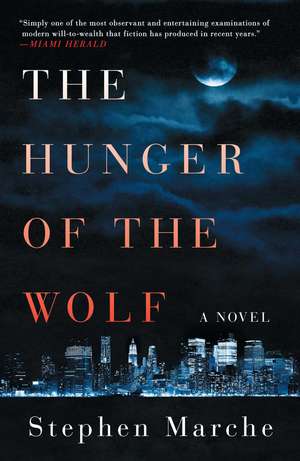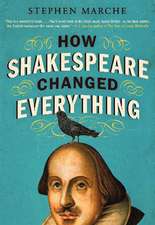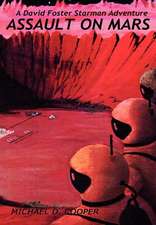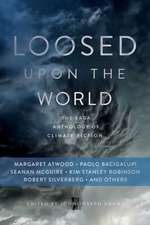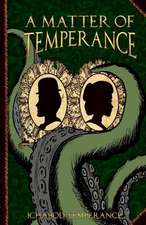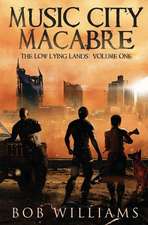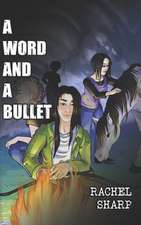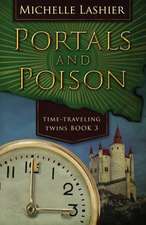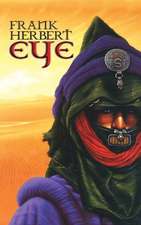The Hunger of the Wolf: A Novel
Autor Stephen Marcheen Limba Engleză Paperback – 19 oct 2016
A “spellbinding” literary novel with fangs: a sweeping, genre-busting tale of money, morality, and the American Dream—and the men and monsters who profit in its pursuit—set in New York, London, and the Canadian wilderness.
Hunters found his body naked in the snow. The body is that of Ben Wylie, the second-richest man in America, and it is found in a remote patch of northern Canada. Far away, in New York, the son of the Wylie family’s housekeepers tries to figure out how and why Ben died. The answer lies in the tortured history of the Wylie family, who built up their massive fortune over three generations. All of the Wylie men struggle with a secret: they are werewolves. The threads of their destinies, both financial and supernatural, lead twistingly but inevitably to the naked body in the snow and a final, terrible revelation.
The Hunger of the Wolf is a novel about what it means to be a man in a world of money. It’s a novel about the innate nature of violence: The Wylie men struggle to control their inner rage, through physical restraint, psychotherapy, drugs, hedonistic abandon, and good old-fashioned denial. It’s a story of fathers and sons, about secrets that are kept in families, and about the cost of the tension between the public face and the private soul—the cruelty and loneliness and occasional joy of being a magical being in a quotidian world.
Hunters found his body naked in the snow. The body is that of Ben Wylie, the second-richest man in America, and it is found in a remote patch of northern Canada. Far away, in New York, the son of the Wylie family’s housekeepers tries to figure out how and why Ben died. The answer lies in the tortured history of the Wylie family, who built up their massive fortune over three generations. All of the Wylie men struggle with a secret: they are werewolves. The threads of their destinies, both financial and supernatural, lead twistingly but inevitably to the naked body in the snow and a final, terrible revelation.
The Hunger of the Wolf is a novel about what it means to be a man in a world of money. It’s a novel about the innate nature of violence: The Wylie men struggle to control their inner rage, through physical restraint, psychotherapy, drugs, hedonistic abandon, and good old-fashioned denial. It’s a story of fathers and sons, about secrets that are kept in families, and about the cost of the tension between the public face and the private soul—the cruelty and loneliness and occasional joy of being a magical being in a quotidian world.
Preț: 86.16 lei
Nou
Puncte Express: 129
Preț estimativ în valută:
16.49€ • 17.03$ • 13.72£
16.49€ • 17.03$ • 13.72£
Carte disponibilă
Livrare economică 04-18 martie
Preluare comenzi: 021 569.72.76
Specificații
ISBN-13: 9781476730820
ISBN-10: 1476730822
Pagini: 272
Dimensiuni: 140 x 213 x 15 mm
Greutate: 0.23 kg
Editura: Simon&Schuster
Colecția Simon & Schuster
ISBN-10: 1476730822
Pagini: 272
Dimensiuni: 140 x 213 x 15 mm
Greutate: 0.23 kg
Editura: Simon&Schuster
Colecția Simon & Schuster
Notă biografică
Stephen Marche is a novelist and culture writer who has written for The Atlantic, The New York Times, The Wall Street Journal, The New Yorker, Esquire, and many other outlets. His books include three novels, The Hunger of the Wolf, Raymond and Hannah, and Shining at the Bottom of the Sea, as well as The Unmade Bed and How Shakespeare Changed Everything. He lives in Toronto with his wife and children.
Extras
Hunger of the Wolf
Hunters found his body naked in the snow. Peter and Samuel Seguin, Cree brothers who drove from Tamaskan to North Lake every February to shoot moose, stumbled on Ben Wylie in a small clearing of aspens at the end of an abandoned lumber road, his corpse encircled by curiously hesitant ravens. “We were all, like, pow, because he was naked and it was cold and he was just a man to us. We didn’t know what it was that we were looking at,” Samuel Seguin told the reporter from Bloomberg. Only after they had delivered up the body would the brothers learn that the man in the snow, far from being nobody, was the eighth-richest person in the world. Curled naked in the killing cold lay twenty-seven billion dollars.
* * *
The Seguins could never have recognized Ben Wylie. Through discipline and money, he had willed himself into irrelevance. By 2009, his photograph hadn’t appeared in a newspaper for twenty-one years and business pages rarely feature stories about the Wylie companies despite their enormous size. Wealth of the Wylie magnitude, money on the scale of small governments fashioned from the profitable organization of hundreds of thousands of people, can grant itself the power of invisibility, fading into the fabric of everyday life. Capitalism can be good, proper, brutal fun, the biggest schoolyard game in the world. Some kids take all the candy and some kids lose eyes and other kids run home crying. But WylieCorp is too big to be fun. Even the death of the owner warranted, in the judgment of the world’s capital-allotment, less than a half-point drop in its stock price.
The obituarists had to splay their quarter pages with Ben’s grainy appearance at a shareholder’s meeting in 1988—more like Bigfoot in the swamps than a human being. The picture has always been a favorite of newspaper editors, particularly the older, more showoffishly jaded ones, with Ben in well-worn budget sneakers and a suit seemingly borrowed from a middle-management uncle. The most famous photograph of Ben’s grandfather, Dale Wylie, caught him stooping for a sixpence on Fleet Street the day he purchased The Record of London in 1964—at that time the largest media deal in history. Ben’s father, George Wylie, appeared at a public offering of bonds on the NYSE with a four-stitch tear down the back seam of his jacket. Ben’s 1988 picture fit the well-established pattern of the legendary penny-pinching Wylies; he looked exactly like the scion of the world’s cheapest billionaires.
The hustled, deadlined world tells only the stories it has told before. Rather than the mystery of Ben’s death, the magical scene in the snow, the frost-shrouded, fetally coiled symbol revealed in the openness of a primeval clearing, the reporters ran with drudgery, the family pattern, the inheritance of melodramatic restraint. He died “in a freak hunting accident,” Bloomberg mentioned before reciting the list of companies he had owned—another broken family remarkable for their garland of zeroes. The 0.0000001 percent.
Money can turn into everything but we can only turn into ourselves.
* * *
I met Ben Wylie in the aftermath of the 2008 market crash, as the value of the world seemed to have lowered forever, and crisis, as a term, was beginning to lose its ancient meaning, smoothing into an ordinary condition. I met him once, although I had known him, or believed that I had known him, my entire life.
The Wylies own a cottage near North Lake, a town in northern Alberta brimming with quiet judgment and rude health and stuck economically between lumbering and resorts, as if it can’t quite make up its mind whether to frolic in the wilderness or to hack it to smithereens. The Canadian government, in the final land bonanza of 1917, granted Dale Wylie and his brother, Max, a complete section along the Peace River, and in 1937, Dale assumed eight thousand acres on the north side of North Lake, land so scarred by clear-cutting for the lumber mill in Tamaskan that the locals branded Dale a rich American idiot for the outlay of twenty dollars. Now, regrown into a private wilderness, the Wylie property, encompassing three lakes, amounts to a province within a province.
The Wylie cottage itself lacks ambition, at least by the standards of the pleasure domes to weekend warriordom which the Kublai Khans of our moment tend to fantasize for themselves. No Sea-doos or bouncing water trampolines here. Just a small dock for the floatplane, and two canoes by the water, birch bark canoes handcrafted by a local tribe of Dene. A Gothic fireplace, imported in blocks from a German castle, dominates the cottage interior, but otherwise the place is an ordinary Canadian cottage—maybe cleaner than most since a family in the area served as caretakers, trimming the edges of their lawns in the summer and shoveling the Alpine roof of billowy snowdrifts in winter, then in the spring cracking the windows against the cozy atavism of rot. For these infrequent services the local family, the Cabots, earned several thousand dollars a year, even if, that year, the Wylies never bothered to open the place. It was a good deal for that family.
I should know because that family was mine. North Lake was my home. My name is Jamie Cabot. It remains Jamie no matter what I do. I have tried to turn myself into James twice, first when I went away to university, and again when I went away to New York. Though I asserted my Jamesness both times, I inevitably drifted back to Jamie. Now I am resigned. Maybe when I’m sixty, it will change itself to Jim. My grandfather was a Jim Cabot, and one sweltering Depression day, he helped lay the foundation of the Wylies’ cottage between snorts of homemade rum and pineapple juice. Later my mother straightened the doilies on the arms of their sofas. During my childhood, the Wylie family had a vague otherworldliness. I recall, as one of my earliest memories, their floater plane circling overhead in a delicate maple-seed half helix and then skimming, skipping like a stone over the drab lake water. Even as a child, four or five years old, that machine—so like a radio-operated toy—bred in me a sense of my remoteness, my status on the periphery of the world. There are still unnamed lakes in Canada, places marked with numbers because no one cares enough to entitle them. North Lake was such a place, a few random cottages strewn among the boulders and pines. Looking up into the pure overbearing sky at the elegant descending curve of the Wylie biplane, I knew I came from the north, the nothingness, the irrelevant truth.
As an adolescent, when my allowance hinged on how neatly I mowed their lawn, the Wylies were a chore. Or sometimes a lark. I would break into the cottage with my high school friends to drink and screw and listen to the cheesy, lovable collection of antique country records, all neatly filed in red milk crates. Hank Williams. The Carter Family. Johnny Cash before he became interesting. It was either the Wylie place or the quarry, where the chilling howls of distant wolves would sour our jokes, sliver into our make-out sessions, collapse our attempts at nonchalance with that truest sound, the howl.
My mother may never have mentioned the Wylies by name. I only remember her calling them “the family,” as in “the family are coming up so you’d better go over and trim those hedges” or “I never hear if the family are coming to stay until they come to stay.” My father called them “the Americans.” I thought of them as “the money.” Only when I left North Lake—on a Greyhound bus rather than a floatplane—only when I ran as far from home as I could run, intellectually and geographically and morally, did I begin to fathom their prominence. Nothing is stranger to me than the idea that people I know, even casually, matter. I was raised to irrelevance the way Catholics are raised to the Church. I know in my bones that life must be happening elsewhere.
* * *
The Wylies, to me, are like the close ringing of a bright bell, like my mother’s voice calling me home across winter fields. They are lords of money, separated by a chasm from the new breed of plutocrats rising to rule us without so much as a suppressed sigh of debate, the new money with their ridiculous yachts and their continuous plastic surgeries and their bought-and-sold SuperPAC politicians who jangle like the spare change in a pimp’s front pocket. The Wylies are more, much more. The Wylies are rich because they have seen a truth.
Balzac said that behind every great fortune is a great crime. If so, then the Wylies’ crime has been the most human: the desire for growth, the hunger for more. They have never, at any point, been involved in any morally suspect businesses, and not for lack of opportunity. When they were media moguls, they refused to trade favors with politicians. Though they were at the forefront of on-demand television and digital media, they never dabbled in pornography. They have never bought a company to raid its pension fund. If they buy a business, they mean it; they attempt to grow it.
They disdain power and charity, both. When Bill Gates asked the world’s billionaires to promise half their wealth away, the Wylies were never asked and never offered. In an interview for Scottish television in 1963, Dale said straight out, “I am not a giving man. I believe that charity doesn’t help anybody.” His son George, twenty years later, was shocked when a friend who ran a well-digging charity in Africa sent back a check for a hundred dollars. Wasn’t a hundred dollars a hundred dollars? Ben, who in his decade controlling the fortune gave away more every year than his father and grandfather during their combined lifetimes, resented every request.
But the Wylies’ lack of charity isn’t a meanness of spirit, as most outsiders assume. All three Wylie men share the same view of money. They believe in growth; they believe in a fair deal. Charity is a gift, and a gift is the flip side of theft. Given the violence nestled within them, the shame all three men swallowed down the long throat of their lives, their ethical scrupulence was doubly polished, extreme even. No wealthy family in the world has a cleaner conscience. No one’s desperation is quieter. They give so little, they leave so little trace of themselves, not out of humility but out of a kind of intergalactic pride. They are wild men and, like all wild things, even their everyday struggles, the most ordinary movement from moment to moment, for food, for sex, for protection, for comfort, for rest, hunger in all its inarticulate variety, rises as an inevitably failed testament against nothingness. Their fortune exposes the size of their terror, their vitality.
Many rich families, once they scrape their fortunes from the hinterland of the great American middle, drift to the coastal metropolises. The idle and indulged children wander to Los Angeles. New York swallows the ambitious. The well-maintained antique women, displaced by trophy wives or sailboats, redecorate flats in London cyclically. The Wylies have always stayed in a somewhat decrepit mansion in Champlain, Pennsylvania, now a suburb of Pittsburgh, or the cottage in North Lake. Rust or Alberta.
The meaning of the Wylies grew and shifted the farther I wandered from North Lake. Struggling in New York, staring through the various windows of the world, half broken by my envy for all that I couldn’t have, I would look at all the people I could never be and think, “You’re not as rich as the Wylies, are you?” I was proud, if you can imagine such stupidity, of their wealth—the crookedness of our local lives is limitless. Why had they come to North Lake? That question never occurred to me. Why American billionaires, from Pennsylvania, would cross the continent and the border for a summer home somehow seemed to require no explanation.
* * *
Like the brothers who stumbled on his naked corpse at the end of the abandoned road, I failed to recognize Ben Wylie when we met six months before his death, despite my clandestine fascination. We met shortly after I had been fired from The New York Standard, a conservative paper read by about fifty thousand nostalgics lurking somewhere in the dry corners of the sweating city. My firing had a measure of grace I came to cherish later. Mort Wilner, the Standard’s publisher, a robust old-timer with a bow tie, a Tom Selleck moustache, and a moral code, held up a graph across his desk. I squinted to read that ad sales had fallen forty-five percent in a month. “These are the times you’ve been given to live in,” Mort announced and shook my hand.
You can’t argue with graphs. In the struggle between the humans and the graphs, the graphs won. As the escalator drearily lowered me from the heights where a few blessed ones still had employment, I remembered all my clambering to be where I was: covering sports for Toronto papers, attempting big features on restaurant trends and real estate, hustling small gigs, then landing the job at the Standard. Making it had always meant making it in New York. Far worse than losing my job was the chance of losing the city. After the crash, my wife knew her Big Law starter position at Mainwire Price was fragile, and then Torys in Toronto offered her associate partnership. Toronto was then the only major city in the world that had managed to escape the financial calamity (mainly through ingrained caution and a tremendous capacity to endure boredom). For my wife, the deal was clear enough. She believed that a good life in Manhattan could not be earned anymore. You had to own it already or you never would. In Toronto, we could build. We could have “a real life.”
“Why does real life always have to be smaller?” I shouted, during our fourteenth or fifteenth fight on the subject. “Why does real life always mean moving to a shittier city?”
“Moving to Toronto is not the same as dying,” she said. My silence conveyed that I was not quite convinced. “It is amazing to me that you consider having children and giving them a comfortable life in your own country to be small.”
She was right, right about everything, but as I stepped onto the buzzing stream of noon-hour Fifty-fourth Street, I came to the surest decision of my life. No matter what I had to endure or destroy or abandon, I would never leave New York. You know that scene before the intermission in Gone with the Wind, the one where Scarlett O’Hara is standing against the dawn, shoving parsnips into her mouth, shouting, “As God is my witness, I’ll never go hungry again”? It was sort of like that, except I wasn’t hungry. No economic crisis or emerging trend would swallow me up.
Maybe my blazing defiance would have cooled, maybe I would have returned to sensible passivity, to making good Canadian decisions, if I hadn’t seen Jorn Pelledeau walking on the other side of the street. Until that moment, he meant nothing to me. He was just another hustling Canadian lost in New York, whom I know vaguely from home. He was an editor at Vice magazine, mostly of bits like “A Russian Whore’s Guide to Anal” or “How to Date Girls Who Are Much Richer than You,” a master of the fusion of exaltation and degradation which they sell as youth. Thirty-eight dressed as twenty-three, with rolled-up jeans and fluorescent blue sneakers, and a Paul Smith shirt worn loose, he looked like he was winning. I couldn’t stand it. Jorn Pelledeau could not win. I refused to let him. I would not exist in a universe where that man could live in New York and I couldn’t. I would remain in the city no matter what.
And so I am forced to contemplate the possibility that if I had not seen Jorn Pelledeau that day, I would still be married and living in Toronto, probably with children. I let that man shape the destiny of my genetic code. Perhaps Jorn was only an excuse. The geographical differences between my wife and me were pretexts, I’ve come to see. The truth is, like so many marriages, ours was a product of inertia. In the supposedly free-loving cities of Europe and the wealthy Americas, convenience arranges more marriages than Indian aunties. When we were kids, the sex was convenient. When we graduated, moving in together to save rent was convenient. Getting married, to move to America, was highly convenient. But when we were no longer convenient, we no longer were.
Canada was just a name to me by then. My home was among the freelancers, that reluctant tribe found in every city, gathered in semipublic rooms, illuminated by the anxious coziness of Mac glow, drinking four-dollar coffees under the shade of cherry trees. The boys worry about whether their pornography is too weird and the girls worry about their Adderall supply. The more ambitious try to figure out which genre the publishers won’t hate two years from now, and the less ambitious work on screenplays. I found myself in a fairly typical position: I was fighting with all the fury my body and soul could muster to belong to cliques I despised. There were the preprogrammed, utterly predictable Ivy Leaguers who approached every conversation as if they were trying to impress an invisible professor in a seminar they had never left. There were liberal arts college grads who had read The Second Sex, Susan Sontag on camp, and Roland Barthes on photography, and who had listened to The Smiths in high school, and watched a lot of reality television. There were the people who insisted that if you hadn’t tried Molly you hadn’t lived in your own time. There were the people who were in the middle of founding a sort of online version of the Partisan Review and who loathed the people who had founded other online versions of the Partisan Review, and who lived off instant noodles in their closet apartments but could taste the difference between ice cream whipped from local cherry blossoms and ice cream whipped from imported cherry blossoms. There were the children of writers and artists who had attended St. Ann’s in Brooklyn Heights and would do whatever it took to send their kids there, too. And then there were the guys like me, from the sticks. The guys from the sticks usually warmed their suburban hands on the coals of the world’s center for a few years and then slunk back to Omaha or Miami or one of the Portlands with just enough information to assuage their need for superiority over their neighbors. But a few stay and rise. Graydon Carter is a boy from the sticks, from Ottawa. André Leon Talley one day took a bus from Durham, North Carolina.
* * *
The day after my wife moved home to Toronto, I used up my last chance for luxury and flew to Berlin to bandage my shocked pain, to mull over my catastrophes. Berlin is a great city for personal crises. Whatever your problems, the problems of Berlin are so much greater. It’s history’s high roller table; everyone wants to play for the highest stakes there are. I stayed at a youth hostel and wept with suppressed sobs in the shared bathtub. I ate curried sausages. At Checkpoint Charlie, I watched Chinese tourists photographing each other with dress-up American and Russian sentries—the new empire coming to witness the fresh ruins of the old. Even Chinese tourists made me think of the Wylies. They had somehow predicted the improbable handover of power, investing in Chinese manufacturing companies as early as 1986, being fully connected with the Red nobility who had straddled Communism and global markets with such improbable ease.
On my return, I understood my predicament clearly for the first time. New York was filling up with overeducated drifters and overweight homeless, and all my efforts would have to go into staying the former, not becoming the latter. Hanging on by the thinnest of margins, I rustled up some stringer sports and restaurant writing—the energy drink habits of the latest Yankee purchase, where to find real grits in Brooklyn, the quietest coffee shops on the planet—and rented a basement in Washington Heights from a shouty Portuguese couple. I wrote a lot of corporate prospectuses, for coffee chains and oil refineries and macadamia nut farm collectives and sex toy manufacturers. They all paid but I was in that state of unwilling, pleasureless gamble known as “without benefits.” I couldn’t afford for a single thing to go wrong. And I was in my mid-thirties, that time of life when you realize that the one thing life inevitably does is go wrong.
New York was the same at least, even if my role in its drama had shifted: It still had the little black girls at Greek corner diners poring through their pockets for nickels to see what size fries would be dinner that night. It had stores that sold three-thousand-dollar scarves made from the hair of Himalayan goat fetuses. It had the subway and Central Park: meeting places and the means to get to them. It had the best dive bars, the purest obsession with the next, next thing, and the frankest conversations. The greatest gift of New York is that it requires no justification to live there. It’s New York. But slowly I was drifting into that shadowy category of New Yorkers who live in the city because living in New York is something and they have nothing else.
* * *
In this state of being, I met Ben Wylie at the fourth-birthday party of Sigma, the daughter of Leo and Kate Stathapolous. Leo and Kate are my rich friends. They own a Miró and a Paul Klee but are otherwise unostentatious, residing in a voluptuous, eccentric, sandstone four-story in SoHo, which they’ve filled with blond children and brown servants, both of whom they are continually trying to stop from crying. Sigma must have had fifty friends at her birthday. My ex-wife had always hated Kate and Leo. At first, I thought her contempt was mangled envy at Kate’s clothing budget. Later I came to understand that my wife was prejudiced against people who seem to do nothing, particularly women who seem to do nothing—a natural enough point of view for a woman whose quest for partner consumed between eighty and a hundred hours a week.
A caterer took my coat before I was carried away on a floe of sports commissioners’ second wives and art dealers with trust funds and investors in online payday loan sites. I admit I like to watch these people. The men always look like they’re waiting to see what they can get away with, the women have excluded from their lives anything a credit card won’t solve. Kate’s house was almost a gallery, or not a gallery so much as a freewheeling repertory of beauty where everything was available for purchase. Kate’s job—an ancient profession in New York—was bringing together those who are interesting in themselves with those who are interesting because they have money.
On the other side of the room Leo glanced at me over a cynical shoulder with relief. Leo, like me, was not born into money. He had knocked up Kate after they had been dating for a month and their wedding invitations had shotguns printed on them as a half joke. I had met him when he was an editor of the real estate section of the New York Observer. His father sold appliances for a Greek outlet store in Long Island City, and Leo used me to maintain a fresh grip on the old realities. He needed me to look like I thought that ten thousand dollars was an absurd amount to spend on a child’s birthday party without saying that I thought ten thousand dollars was an absurd amount to spend on a child’s birthday party. I obliged.
Behind a Bertoia bird chair, fortified, I could reach the elk sliders and a glass of blaufränkisch from the circulating waiters, and watch the animals, too. Kate had hired one of those mobile zoos for the party. Not that any of the children were old enough to appreciate life’s purchased variety. The lizards frightened them. The rabbits bored them. Only the chinchilla held their attention, its vivid fluff pleasing the investigations of their puffy careless fingers. Fading to the emptiest room in the house, the study, I stumbled on a beast of another sort—a tall, bedraggled, hungry-looking dad in his mid-fifties who had similarly tucked himself away. He was crooked at an angle, crackling with looming tension though his body stood slack, intently studying the small Klee over Leo’s desk.
“What do you think of this?” he asked me, gesturing with a half hand at the painting.
“I think it’s a Klee,” I said. I have since realized that we lost each other in our incomprehension. I couldn’t believe that I was in a house with a real Paul Klee, and he thought I was reducing the painting to its signature, to its market price.
“It’s from 1938. It’s called The Wolf,” he said. The painting itself was a composition of red and deep red and scarlet squares fringed by what looked at first like finely circled roofs. “He did no other drawings called ‘The Wolf.’ He drew angels. He drew foxes. He drew men and women and houses. Why would he call this ‘The Wolf’?”
“It’s red,” I said.
“That’s stupid. Wolves are all colors. Brown, gray, but not red. Except for the nearly extinct red wolves of North Carolina. Foxes are red.”
“No, I meant the color of blood. The color of killing. It’s 1938. The streets are running with blood.”
“So the city is the wolf,” he said, before we were interrupted by a kerfuffle from the direction of the children. His son Max had started a squabble with Sigma over one of the rented creatures, and he had to go tear the kids apart, scold, comfort. That little boy, Ben’s son with his wife Anna Savarin, would, after his father’s death, come into the possession of 28 billion dollars at the age of six.
So ended my sole encounter with Ben Wylie, the man who now crouches like an icon, frozen and naked, in one or another of the chambers of my heart. Ben looked nothing like his photograph, much slimmer, more elegant; his eyes were more tired, more intelligent. No distinction of body hinted that I was discussing the meaning of Paul Klee with the eighth-richest man in the world. At the time, I imagined he was an outsider like myself, not yet attuned to the vibrations of the internationalized parochial urbanized elite and their code, which must be intuited by perpetual fiddling, like a radio station just out of range. If personality is dancing to music that nobody else may hear, then his jerky sudden gestures hinted at a rolling shuffle, a pastiche of florid, zany melodies, or perhaps silence, no music at all. Perhaps he did his dance over nothing.
Leo rumbled over after the party began to wind down. “An argument over an animal,” he explained with sheepish pride. “Sigma and little Max had a fight over a blue-tongued skink.”
“Everybody survive?” I asked.
“Even the blue-tongued skink. Though I suppose there are better practices for my daughter than spitting on the heir to the Wylie fortune.”
“That was Ben Wylie?” I asked, amazed as much by my failure to recognize him as by his attendance. I had never seen Ben before, but I could recall with ludicrous precision the one time I had encountered his more famous sister Poppy. I must have been eight, a boy in late summer, playing on the rusty swing set on our front lawn. Her limousine had pulled up beside our house. The window rolled down and a woman looked out, a great beauty—a great indifference would be a more precise term. I did not know then about her time on all the covers of the magazines, her celebrity, her reputed string of lovers, Lou Reed and Ayrton Senna and the others, but I knew, even before then, that she was the real world of which my own experience was only a dappled, incomplete reflection.
“I hope you have good lawyers,” I said.
Leo’s hand imbued my shoulder with mock gravitas. “At least the kid is meeting the right sort of people.” He needed my approval again. Leo was always in need of something. In need of a cigarette to smoke or a golf club to swing. In need of a helping hand. Probably in need of a good talking-to. Possibly in need of money. Just generally in need, though the man had everything that a reasonable person could desire.
Kate joined us, miming exhaustion with a droop of her shoulders, hugging Leo loosely around the belly. “Sigma’s napping,” she said dreamily.
“We all should be so lucky,” Leo said, kissing the part in her hair with the tenderness of a salesman before a negotiation.
Kate’s good fortune radiated. The handsome husband. The beautiful daughter. The house in SoHo. The wealthy friends (Ben Wylie) and the interesting friends (me). Now I can see, looking back on my sole encounter at Leo and Kate’s house, that one of the reasons I didn’t recognize Ben was my incredulity that a Wylie would be out eating Moshi Monster birthday cake, looking at paintings, scolding children. In the recesses of my imagination, the Wylies dwell far, far from children’s birthday parties in the shivering wasteland of their utterly banal mystery.
* * *
It took my father’s death to bring me back to Alberta. A pulmonary embolism blew his brains out in the breakfast cereal aisle at the local Safeway. He died at the age of sixty-one, before he had a chance to grow old. A guy I went to high school with, a Mountie, informed me over the phone while I was on the Q train returning from Coney Island. Three Russian women inspected my pain with a reserved fatalistic air I appreciated as I began openly sobbing.
I hadn’t seen North Lake in ten years. My parents had always visited me, traveling to wherever I happened to be. The funeral for my father was in the school gym where I had received my high school diploma and accidentally cut Jimmy Prescott’s eye playing ball hockey in the third grade, and where I had, one glorious April morning, skipping biology, fingerfucked curious, fervid Mellissa Leung in the darkest corner we could find. Everyone in town came for Dad. The managers from the pulp and paper mill where he had worked as an accountant, the farmers and ranchers, the townies who worked the resorts. My father had helped them all with money. He had been that guy. He had explained the difference between appreciating and depreciating assets, the connections between retirement savings and the tax code, the power of compound interest. All those rough men who wanted to shake my soft hand, all their wives who pressed against my too-crisp suit, their mourning was genuine, not sentimental. The world had lost a useful man. Are you useful? Am I? I tried to be that afternoon. I held my mother’s hand as a half dozen North Lakers spoke halting words over his manicured corpse.
After the funeral, while my mother napped, I stared numbly out the front window; the Wylies’ lawn was ragged. So I found myself at the age of thirty-five mowing Ben Wylie’s grass. Then I found myself slipping inside the old cottage to smell the disintegrating country album smell, to stare upon the ridiculous paintings on nautical themes crowding the walls, to inhale the residue of my teenage naïveté, my teenage longing. To remember life before my firing, before my separation, before my father’s death. The slightly sweating walls were still sweating slightly. The thick white shag carpeting that my mother hated because it was so hard to vacuum remained thick and white. I lay down in the stale regret I was indulging so thoroughly that year. There seemed to be no end to the end of innocence.
In a nook off the living room, a small well-lit space with a desk overlooking the lake, the painting surprised me. Sitting on a pile of books, leaning against the cracked wall, The Wolf by Paul Klee. I picked the canvas up to assure myself that it was no reproduction. He must have bought it from Leo and Kate. My wonder infused with doom: The painting must have taken the same ridiculous flight as myself, the same five-hour car ride. I was holding a concatenation of paint and canvas worth several million dollars.
An envelope peeked out from a large leather folio of Audubon’s Birds of America. It was the letter George wrote to Ben in the eighties about his struggle to uncover their origins. All the personal papers, the private history of the Wylies, the record they kept to help each other through their inherited sickness—I found them tucked inside other books, in furniture crevices, inside a blue trunk that served as an ersatz coffee table. I had fled my hometown to gain an education in the world, but the education I sought, a glance into the hidden workings of the machinery, had been there all along. I discovered the basement too, its dirt floors scarred with claws and a large cage fitted with chain leashes.
* * *
I left the painting in North Lake. I took everything else, every paper I could suss from the nooks and crannies of the Wylie cottage, back to New York in their blue trunk. Sneaking out the material without my mother noticing was embarrassingly adolescent, but adolescently delicious as well; forbidden cigarettes and forbidden knowledge are always the best kind.
The miniature Wylie archive I had purloined filled the shouty Portuguese basement. In the morning I would spread out the diaries and the letters and the photographs and the newspaper clippings that I arranged into a vast map to a subterranean geography, and in the evening I would fold up their secrets like a tablecloth, delicately fearful that a crumb of significance might tumble off. The presence of Wylies gave my subterranean life the thrill of a secret, the secret history of how money became everything. Stealing up to the street to eat, or to fulfill the conditions of some gig, I could anchor my drifting self to the blue trunk. I only wanted to be back with them, in my dark room. The Wylies had always been my unspoken fascination. The job of a writer is to monetize fascination. I was broke and alone but I had them.
If I could uncover their story, I could sell their story, and if I could sell their story, I might have something like a future in New York. Every story is a little miracle. You make it out of nothing and you sell it for money.
* * *
The Mounties declared Ben’s death a hunting accident. His nakedness was easy to explain, at least to the professionals. In the final stages of hypothermia, the body often senses warmth as the blood ebbs into the core. Many hypothermic deaths end with naked corpses. Coyotes or a bear may have dragged off his clothes, or wolves, who would have buried the clothes. Even if Ben Wylie had been murdered, if somebody had wanted to kill him, that somebody was far away. The official cause was death by exposure. Everyone seemed to agree, without bothering to look too closely, that the wilderness had killed him.
Hunters found his body naked in the snow. Peter and Samuel Seguin, Cree brothers who drove from Tamaskan to North Lake every February to shoot moose, stumbled on Ben Wylie in a small clearing of aspens at the end of an abandoned lumber road, his corpse encircled by curiously hesitant ravens. “We were all, like, pow, because he was naked and it was cold and he was just a man to us. We didn’t know what it was that we were looking at,” Samuel Seguin told the reporter from Bloomberg. Only after they had delivered up the body would the brothers learn that the man in the snow, far from being nobody, was the eighth-richest person in the world. Curled naked in the killing cold lay twenty-seven billion dollars.
* * *
The Seguins could never have recognized Ben Wylie. Through discipline and money, he had willed himself into irrelevance. By 2009, his photograph hadn’t appeared in a newspaper for twenty-one years and business pages rarely feature stories about the Wylie companies despite their enormous size. Wealth of the Wylie magnitude, money on the scale of small governments fashioned from the profitable organization of hundreds of thousands of people, can grant itself the power of invisibility, fading into the fabric of everyday life. Capitalism can be good, proper, brutal fun, the biggest schoolyard game in the world. Some kids take all the candy and some kids lose eyes and other kids run home crying. But WylieCorp is too big to be fun. Even the death of the owner warranted, in the judgment of the world’s capital-allotment, less than a half-point drop in its stock price.
The obituarists had to splay their quarter pages with Ben’s grainy appearance at a shareholder’s meeting in 1988—more like Bigfoot in the swamps than a human being. The picture has always been a favorite of newspaper editors, particularly the older, more showoffishly jaded ones, with Ben in well-worn budget sneakers and a suit seemingly borrowed from a middle-management uncle. The most famous photograph of Ben’s grandfather, Dale Wylie, caught him stooping for a sixpence on Fleet Street the day he purchased The Record of London in 1964—at that time the largest media deal in history. Ben’s father, George Wylie, appeared at a public offering of bonds on the NYSE with a four-stitch tear down the back seam of his jacket. Ben’s 1988 picture fit the well-established pattern of the legendary penny-pinching Wylies; he looked exactly like the scion of the world’s cheapest billionaires.
The hustled, deadlined world tells only the stories it has told before. Rather than the mystery of Ben’s death, the magical scene in the snow, the frost-shrouded, fetally coiled symbol revealed in the openness of a primeval clearing, the reporters ran with drudgery, the family pattern, the inheritance of melodramatic restraint. He died “in a freak hunting accident,” Bloomberg mentioned before reciting the list of companies he had owned—another broken family remarkable for their garland of zeroes. The 0.0000001 percent.
Money can turn into everything but we can only turn into ourselves.
* * *
I met Ben Wylie in the aftermath of the 2008 market crash, as the value of the world seemed to have lowered forever, and crisis, as a term, was beginning to lose its ancient meaning, smoothing into an ordinary condition. I met him once, although I had known him, or believed that I had known him, my entire life.
The Wylies own a cottage near North Lake, a town in northern Alberta brimming with quiet judgment and rude health and stuck economically between lumbering and resorts, as if it can’t quite make up its mind whether to frolic in the wilderness or to hack it to smithereens. The Canadian government, in the final land bonanza of 1917, granted Dale Wylie and his brother, Max, a complete section along the Peace River, and in 1937, Dale assumed eight thousand acres on the north side of North Lake, land so scarred by clear-cutting for the lumber mill in Tamaskan that the locals branded Dale a rich American idiot for the outlay of twenty dollars. Now, regrown into a private wilderness, the Wylie property, encompassing three lakes, amounts to a province within a province.
The Wylie cottage itself lacks ambition, at least by the standards of the pleasure domes to weekend warriordom which the Kublai Khans of our moment tend to fantasize for themselves. No Sea-doos or bouncing water trampolines here. Just a small dock for the floatplane, and two canoes by the water, birch bark canoes handcrafted by a local tribe of Dene. A Gothic fireplace, imported in blocks from a German castle, dominates the cottage interior, but otherwise the place is an ordinary Canadian cottage—maybe cleaner than most since a family in the area served as caretakers, trimming the edges of their lawns in the summer and shoveling the Alpine roof of billowy snowdrifts in winter, then in the spring cracking the windows against the cozy atavism of rot. For these infrequent services the local family, the Cabots, earned several thousand dollars a year, even if, that year, the Wylies never bothered to open the place. It was a good deal for that family.
I should know because that family was mine. North Lake was my home. My name is Jamie Cabot. It remains Jamie no matter what I do. I have tried to turn myself into James twice, first when I went away to university, and again when I went away to New York. Though I asserted my Jamesness both times, I inevitably drifted back to Jamie. Now I am resigned. Maybe when I’m sixty, it will change itself to Jim. My grandfather was a Jim Cabot, and one sweltering Depression day, he helped lay the foundation of the Wylies’ cottage between snorts of homemade rum and pineapple juice. Later my mother straightened the doilies on the arms of their sofas. During my childhood, the Wylie family had a vague otherworldliness. I recall, as one of my earliest memories, their floater plane circling overhead in a delicate maple-seed half helix and then skimming, skipping like a stone over the drab lake water. Even as a child, four or five years old, that machine—so like a radio-operated toy—bred in me a sense of my remoteness, my status on the periphery of the world. There are still unnamed lakes in Canada, places marked with numbers because no one cares enough to entitle them. North Lake was such a place, a few random cottages strewn among the boulders and pines. Looking up into the pure overbearing sky at the elegant descending curve of the Wylie biplane, I knew I came from the north, the nothingness, the irrelevant truth.
As an adolescent, when my allowance hinged on how neatly I mowed their lawn, the Wylies were a chore. Or sometimes a lark. I would break into the cottage with my high school friends to drink and screw and listen to the cheesy, lovable collection of antique country records, all neatly filed in red milk crates. Hank Williams. The Carter Family. Johnny Cash before he became interesting. It was either the Wylie place or the quarry, where the chilling howls of distant wolves would sour our jokes, sliver into our make-out sessions, collapse our attempts at nonchalance with that truest sound, the howl.
My mother may never have mentioned the Wylies by name. I only remember her calling them “the family,” as in “the family are coming up so you’d better go over and trim those hedges” or “I never hear if the family are coming to stay until they come to stay.” My father called them “the Americans.” I thought of them as “the money.” Only when I left North Lake—on a Greyhound bus rather than a floatplane—only when I ran as far from home as I could run, intellectually and geographically and morally, did I begin to fathom their prominence. Nothing is stranger to me than the idea that people I know, even casually, matter. I was raised to irrelevance the way Catholics are raised to the Church. I know in my bones that life must be happening elsewhere.
* * *
The Wylies, to me, are like the close ringing of a bright bell, like my mother’s voice calling me home across winter fields. They are lords of money, separated by a chasm from the new breed of plutocrats rising to rule us without so much as a suppressed sigh of debate, the new money with their ridiculous yachts and their continuous plastic surgeries and their bought-and-sold SuperPAC politicians who jangle like the spare change in a pimp’s front pocket. The Wylies are more, much more. The Wylies are rich because they have seen a truth.
Balzac said that behind every great fortune is a great crime. If so, then the Wylies’ crime has been the most human: the desire for growth, the hunger for more. They have never, at any point, been involved in any morally suspect businesses, and not for lack of opportunity. When they were media moguls, they refused to trade favors with politicians. Though they were at the forefront of on-demand television and digital media, they never dabbled in pornography. They have never bought a company to raid its pension fund. If they buy a business, they mean it; they attempt to grow it.
They disdain power and charity, both. When Bill Gates asked the world’s billionaires to promise half their wealth away, the Wylies were never asked and never offered. In an interview for Scottish television in 1963, Dale said straight out, “I am not a giving man. I believe that charity doesn’t help anybody.” His son George, twenty years later, was shocked when a friend who ran a well-digging charity in Africa sent back a check for a hundred dollars. Wasn’t a hundred dollars a hundred dollars? Ben, who in his decade controlling the fortune gave away more every year than his father and grandfather during their combined lifetimes, resented every request.
But the Wylies’ lack of charity isn’t a meanness of spirit, as most outsiders assume. All three Wylie men share the same view of money. They believe in growth; they believe in a fair deal. Charity is a gift, and a gift is the flip side of theft. Given the violence nestled within them, the shame all three men swallowed down the long throat of their lives, their ethical scrupulence was doubly polished, extreme even. No wealthy family in the world has a cleaner conscience. No one’s desperation is quieter. They give so little, they leave so little trace of themselves, not out of humility but out of a kind of intergalactic pride. They are wild men and, like all wild things, even their everyday struggles, the most ordinary movement from moment to moment, for food, for sex, for protection, for comfort, for rest, hunger in all its inarticulate variety, rises as an inevitably failed testament against nothingness. Their fortune exposes the size of their terror, their vitality.
Many rich families, once they scrape their fortunes from the hinterland of the great American middle, drift to the coastal metropolises. The idle and indulged children wander to Los Angeles. New York swallows the ambitious. The well-maintained antique women, displaced by trophy wives or sailboats, redecorate flats in London cyclically. The Wylies have always stayed in a somewhat decrepit mansion in Champlain, Pennsylvania, now a suburb of Pittsburgh, or the cottage in North Lake. Rust or Alberta.
The meaning of the Wylies grew and shifted the farther I wandered from North Lake. Struggling in New York, staring through the various windows of the world, half broken by my envy for all that I couldn’t have, I would look at all the people I could never be and think, “You’re not as rich as the Wylies, are you?” I was proud, if you can imagine such stupidity, of their wealth—the crookedness of our local lives is limitless. Why had they come to North Lake? That question never occurred to me. Why American billionaires, from Pennsylvania, would cross the continent and the border for a summer home somehow seemed to require no explanation.
* * *
Like the brothers who stumbled on his naked corpse at the end of the abandoned road, I failed to recognize Ben Wylie when we met six months before his death, despite my clandestine fascination. We met shortly after I had been fired from The New York Standard, a conservative paper read by about fifty thousand nostalgics lurking somewhere in the dry corners of the sweating city. My firing had a measure of grace I came to cherish later. Mort Wilner, the Standard’s publisher, a robust old-timer with a bow tie, a Tom Selleck moustache, and a moral code, held up a graph across his desk. I squinted to read that ad sales had fallen forty-five percent in a month. “These are the times you’ve been given to live in,” Mort announced and shook my hand.
You can’t argue with graphs. In the struggle between the humans and the graphs, the graphs won. As the escalator drearily lowered me from the heights where a few blessed ones still had employment, I remembered all my clambering to be where I was: covering sports for Toronto papers, attempting big features on restaurant trends and real estate, hustling small gigs, then landing the job at the Standard. Making it had always meant making it in New York. Far worse than losing my job was the chance of losing the city. After the crash, my wife knew her Big Law starter position at Mainwire Price was fragile, and then Torys in Toronto offered her associate partnership. Toronto was then the only major city in the world that had managed to escape the financial calamity (mainly through ingrained caution and a tremendous capacity to endure boredom). For my wife, the deal was clear enough. She believed that a good life in Manhattan could not be earned anymore. You had to own it already or you never would. In Toronto, we could build. We could have “a real life.”
“Why does real life always have to be smaller?” I shouted, during our fourteenth or fifteenth fight on the subject. “Why does real life always mean moving to a shittier city?”
“Moving to Toronto is not the same as dying,” she said. My silence conveyed that I was not quite convinced. “It is amazing to me that you consider having children and giving them a comfortable life in your own country to be small.”
She was right, right about everything, but as I stepped onto the buzzing stream of noon-hour Fifty-fourth Street, I came to the surest decision of my life. No matter what I had to endure or destroy or abandon, I would never leave New York. You know that scene before the intermission in Gone with the Wind, the one where Scarlett O’Hara is standing against the dawn, shoving parsnips into her mouth, shouting, “As God is my witness, I’ll never go hungry again”? It was sort of like that, except I wasn’t hungry. No economic crisis or emerging trend would swallow me up.
Maybe my blazing defiance would have cooled, maybe I would have returned to sensible passivity, to making good Canadian decisions, if I hadn’t seen Jorn Pelledeau walking on the other side of the street. Until that moment, he meant nothing to me. He was just another hustling Canadian lost in New York, whom I know vaguely from home. He was an editor at Vice magazine, mostly of bits like “A Russian Whore’s Guide to Anal” or “How to Date Girls Who Are Much Richer than You,” a master of the fusion of exaltation and degradation which they sell as youth. Thirty-eight dressed as twenty-three, with rolled-up jeans and fluorescent blue sneakers, and a Paul Smith shirt worn loose, he looked like he was winning. I couldn’t stand it. Jorn Pelledeau could not win. I refused to let him. I would not exist in a universe where that man could live in New York and I couldn’t. I would remain in the city no matter what.
And so I am forced to contemplate the possibility that if I had not seen Jorn Pelledeau that day, I would still be married and living in Toronto, probably with children. I let that man shape the destiny of my genetic code. Perhaps Jorn was only an excuse. The geographical differences between my wife and me were pretexts, I’ve come to see. The truth is, like so many marriages, ours was a product of inertia. In the supposedly free-loving cities of Europe and the wealthy Americas, convenience arranges more marriages than Indian aunties. When we were kids, the sex was convenient. When we graduated, moving in together to save rent was convenient. Getting married, to move to America, was highly convenient. But when we were no longer convenient, we no longer were.
Canada was just a name to me by then. My home was among the freelancers, that reluctant tribe found in every city, gathered in semipublic rooms, illuminated by the anxious coziness of Mac glow, drinking four-dollar coffees under the shade of cherry trees. The boys worry about whether their pornography is too weird and the girls worry about their Adderall supply. The more ambitious try to figure out which genre the publishers won’t hate two years from now, and the less ambitious work on screenplays. I found myself in a fairly typical position: I was fighting with all the fury my body and soul could muster to belong to cliques I despised. There were the preprogrammed, utterly predictable Ivy Leaguers who approached every conversation as if they were trying to impress an invisible professor in a seminar they had never left. There were liberal arts college grads who had read The Second Sex, Susan Sontag on camp, and Roland Barthes on photography, and who had listened to The Smiths in high school, and watched a lot of reality television. There were the people who insisted that if you hadn’t tried Molly you hadn’t lived in your own time. There were the people who were in the middle of founding a sort of online version of the Partisan Review and who loathed the people who had founded other online versions of the Partisan Review, and who lived off instant noodles in their closet apartments but could taste the difference between ice cream whipped from local cherry blossoms and ice cream whipped from imported cherry blossoms. There were the children of writers and artists who had attended St. Ann’s in Brooklyn Heights and would do whatever it took to send their kids there, too. And then there were the guys like me, from the sticks. The guys from the sticks usually warmed their suburban hands on the coals of the world’s center for a few years and then slunk back to Omaha or Miami or one of the Portlands with just enough information to assuage their need for superiority over their neighbors. But a few stay and rise. Graydon Carter is a boy from the sticks, from Ottawa. André Leon Talley one day took a bus from Durham, North Carolina.
* * *
The day after my wife moved home to Toronto, I used up my last chance for luxury and flew to Berlin to bandage my shocked pain, to mull over my catastrophes. Berlin is a great city for personal crises. Whatever your problems, the problems of Berlin are so much greater. It’s history’s high roller table; everyone wants to play for the highest stakes there are. I stayed at a youth hostel and wept with suppressed sobs in the shared bathtub. I ate curried sausages. At Checkpoint Charlie, I watched Chinese tourists photographing each other with dress-up American and Russian sentries—the new empire coming to witness the fresh ruins of the old. Even Chinese tourists made me think of the Wylies. They had somehow predicted the improbable handover of power, investing in Chinese manufacturing companies as early as 1986, being fully connected with the Red nobility who had straddled Communism and global markets with such improbable ease.
On my return, I understood my predicament clearly for the first time. New York was filling up with overeducated drifters and overweight homeless, and all my efforts would have to go into staying the former, not becoming the latter. Hanging on by the thinnest of margins, I rustled up some stringer sports and restaurant writing—the energy drink habits of the latest Yankee purchase, where to find real grits in Brooklyn, the quietest coffee shops on the planet—and rented a basement in Washington Heights from a shouty Portuguese couple. I wrote a lot of corporate prospectuses, for coffee chains and oil refineries and macadamia nut farm collectives and sex toy manufacturers. They all paid but I was in that state of unwilling, pleasureless gamble known as “without benefits.” I couldn’t afford for a single thing to go wrong. And I was in my mid-thirties, that time of life when you realize that the one thing life inevitably does is go wrong.
New York was the same at least, even if my role in its drama had shifted: It still had the little black girls at Greek corner diners poring through their pockets for nickels to see what size fries would be dinner that night. It had stores that sold three-thousand-dollar scarves made from the hair of Himalayan goat fetuses. It had the subway and Central Park: meeting places and the means to get to them. It had the best dive bars, the purest obsession with the next, next thing, and the frankest conversations. The greatest gift of New York is that it requires no justification to live there. It’s New York. But slowly I was drifting into that shadowy category of New Yorkers who live in the city because living in New York is something and they have nothing else.
* * *
In this state of being, I met Ben Wylie at the fourth-birthday party of Sigma, the daughter of Leo and Kate Stathapolous. Leo and Kate are my rich friends. They own a Miró and a Paul Klee but are otherwise unostentatious, residing in a voluptuous, eccentric, sandstone four-story in SoHo, which they’ve filled with blond children and brown servants, both of whom they are continually trying to stop from crying. Sigma must have had fifty friends at her birthday. My ex-wife had always hated Kate and Leo. At first, I thought her contempt was mangled envy at Kate’s clothing budget. Later I came to understand that my wife was prejudiced against people who seem to do nothing, particularly women who seem to do nothing—a natural enough point of view for a woman whose quest for partner consumed between eighty and a hundred hours a week.
A caterer took my coat before I was carried away on a floe of sports commissioners’ second wives and art dealers with trust funds and investors in online payday loan sites. I admit I like to watch these people. The men always look like they’re waiting to see what they can get away with, the women have excluded from their lives anything a credit card won’t solve. Kate’s house was almost a gallery, or not a gallery so much as a freewheeling repertory of beauty where everything was available for purchase. Kate’s job—an ancient profession in New York—was bringing together those who are interesting in themselves with those who are interesting because they have money.
On the other side of the room Leo glanced at me over a cynical shoulder with relief. Leo, like me, was not born into money. He had knocked up Kate after they had been dating for a month and their wedding invitations had shotguns printed on them as a half joke. I had met him when he was an editor of the real estate section of the New York Observer. His father sold appliances for a Greek outlet store in Long Island City, and Leo used me to maintain a fresh grip on the old realities. He needed me to look like I thought that ten thousand dollars was an absurd amount to spend on a child’s birthday party without saying that I thought ten thousand dollars was an absurd amount to spend on a child’s birthday party. I obliged.
Behind a Bertoia bird chair, fortified, I could reach the elk sliders and a glass of blaufränkisch from the circulating waiters, and watch the animals, too. Kate had hired one of those mobile zoos for the party. Not that any of the children were old enough to appreciate life’s purchased variety. The lizards frightened them. The rabbits bored them. Only the chinchilla held their attention, its vivid fluff pleasing the investigations of their puffy careless fingers. Fading to the emptiest room in the house, the study, I stumbled on a beast of another sort—a tall, bedraggled, hungry-looking dad in his mid-fifties who had similarly tucked himself away. He was crooked at an angle, crackling with looming tension though his body stood slack, intently studying the small Klee over Leo’s desk.
“What do you think of this?” he asked me, gesturing with a half hand at the painting.
“I think it’s a Klee,” I said. I have since realized that we lost each other in our incomprehension. I couldn’t believe that I was in a house with a real Paul Klee, and he thought I was reducing the painting to its signature, to its market price.
“It’s from 1938. It’s called The Wolf,” he said. The painting itself was a composition of red and deep red and scarlet squares fringed by what looked at first like finely circled roofs. “He did no other drawings called ‘The Wolf.’ He drew angels. He drew foxes. He drew men and women and houses. Why would he call this ‘The Wolf’?”
“It’s red,” I said.
“That’s stupid. Wolves are all colors. Brown, gray, but not red. Except for the nearly extinct red wolves of North Carolina. Foxes are red.”
“No, I meant the color of blood. The color of killing. It’s 1938. The streets are running with blood.”
“So the city is the wolf,” he said, before we were interrupted by a kerfuffle from the direction of the children. His son Max had started a squabble with Sigma over one of the rented creatures, and he had to go tear the kids apart, scold, comfort. That little boy, Ben’s son with his wife Anna Savarin, would, after his father’s death, come into the possession of 28 billion dollars at the age of six.
So ended my sole encounter with Ben Wylie, the man who now crouches like an icon, frozen and naked, in one or another of the chambers of my heart. Ben looked nothing like his photograph, much slimmer, more elegant; his eyes were more tired, more intelligent. No distinction of body hinted that I was discussing the meaning of Paul Klee with the eighth-richest man in the world. At the time, I imagined he was an outsider like myself, not yet attuned to the vibrations of the internationalized parochial urbanized elite and their code, which must be intuited by perpetual fiddling, like a radio station just out of range. If personality is dancing to music that nobody else may hear, then his jerky sudden gestures hinted at a rolling shuffle, a pastiche of florid, zany melodies, or perhaps silence, no music at all. Perhaps he did his dance over nothing.
Leo rumbled over after the party began to wind down. “An argument over an animal,” he explained with sheepish pride. “Sigma and little Max had a fight over a blue-tongued skink.”
“Everybody survive?” I asked.
“Even the blue-tongued skink. Though I suppose there are better practices for my daughter than spitting on the heir to the Wylie fortune.”
“That was Ben Wylie?” I asked, amazed as much by my failure to recognize him as by his attendance. I had never seen Ben before, but I could recall with ludicrous precision the one time I had encountered his more famous sister Poppy. I must have been eight, a boy in late summer, playing on the rusty swing set on our front lawn. Her limousine had pulled up beside our house. The window rolled down and a woman looked out, a great beauty—a great indifference would be a more precise term. I did not know then about her time on all the covers of the magazines, her celebrity, her reputed string of lovers, Lou Reed and Ayrton Senna and the others, but I knew, even before then, that she was the real world of which my own experience was only a dappled, incomplete reflection.
“I hope you have good lawyers,” I said.
Leo’s hand imbued my shoulder with mock gravitas. “At least the kid is meeting the right sort of people.” He needed my approval again. Leo was always in need of something. In need of a cigarette to smoke or a golf club to swing. In need of a helping hand. Probably in need of a good talking-to. Possibly in need of money. Just generally in need, though the man had everything that a reasonable person could desire.
Kate joined us, miming exhaustion with a droop of her shoulders, hugging Leo loosely around the belly. “Sigma’s napping,” she said dreamily.
“We all should be so lucky,” Leo said, kissing the part in her hair with the tenderness of a salesman before a negotiation.
Kate’s good fortune radiated. The handsome husband. The beautiful daughter. The house in SoHo. The wealthy friends (Ben Wylie) and the interesting friends (me). Now I can see, looking back on my sole encounter at Leo and Kate’s house, that one of the reasons I didn’t recognize Ben was my incredulity that a Wylie would be out eating Moshi Monster birthday cake, looking at paintings, scolding children. In the recesses of my imagination, the Wylies dwell far, far from children’s birthday parties in the shivering wasteland of their utterly banal mystery.
* * *
It took my father’s death to bring me back to Alberta. A pulmonary embolism blew his brains out in the breakfast cereal aisle at the local Safeway. He died at the age of sixty-one, before he had a chance to grow old. A guy I went to high school with, a Mountie, informed me over the phone while I was on the Q train returning from Coney Island. Three Russian women inspected my pain with a reserved fatalistic air I appreciated as I began openly sobbing.
I hadn’t seen North Lake in ten years. My parents had always visited me, traveling to wherever I happened to be. The funeral for my father was in the school gym where I had received my high school diploma and accidentally cut Jimmy Prescott’s eye playing ball hockey in the third grade, and where I had, one glorious April morning, skipping biology, fingerfucked curious, fervid Mellissa Leung in the darkest corner we could find. Everyone in town came for Dad. The managers from the pulp and paper mill where he had worked as an accountant, the farmers and ranchers, the townies who worked the resorts. My father had helped them all with money. He had been that guy. He had explained the difference between appreciating and depreciating assets, the connections between retirement savings and the tax code, the power of compound interest. All those rough men who wanted to shake my soft hand, all their wives who pressed against my too-crisp suit, their mourning was genuine, not sentimental. The world had lost a useful man. Are you useful? Am I? I tried to be that afternoon. I held my mother’s hand as a half dozen North Lakers spoke halting words over his manicured corpse.
After the funeral, while my mother napped, I stared numbly out the front window; the Wylies’ lawn was ragged. So I found myself at the age of thirty-five mowing Ben Wylie’s grass. Then I found myself slipping inside the old cottage to smell the disintegrating country album smell, to stare upon the ridiculous paintings on nautical themes crowding the walls, to inhale the residue of my teenage naïveté, my teenage longing. To remember life before my firing, before my separation, before my father’s death. The slightly sweating walls were still sweating slightly. The thick white shag carpeting that my mother hated because it was so hard to vacuum remained thick and white. I lay down in the stale regret I was indulging so thoroughly that year. There seemed to be no end to the end of innocence.
In a nook off the living room, a small well-lit space with a desk overlooking the lake, the painting surprised me. Sitting on a pile of books, leaning against the cracked wall, The Wolf by Paul Klee. I picked the canvas up to assure myself that it was no reproduction. He must have bought it from Leo and Kate. My wonder infused with doom: The painting must have taken the same ridiculous flight as myself, the same five-hour car ride. I was holding a concatenation of paint and canvas worth several million dollars.
An envelope peeked out from a large leather folio of Audubon’s Birds of America. It was the letter George wrote to Ben in the eighties about his struggle to uncover their origins. All the personal papers, the private history of the Wylies, the record they kept to help each other through their inherited sickness—I found them tucked inside other books, in furniture crevices, inside a blue trunk that served as an ersatz coffee table. I had fled my hometown to gain an education in the world, but the education I sought, a glance into the hidden workings of the machinery, had been there all along. I discovered the basement too, its dirt floors scarred with claws and a large cage fitted with chain leashes.
* * *
I left the painting in North Lake. I took everything else, every paper I could suss from the nooks and crannies of the Wylie cottage, back to New York in their blue trunk. Sneaking out the material without my mother noticing was embarrassingly adolescent, but adolescently delicious as well; forbidden cigarettes and forbidden knowledge are always the best kind.
The miniature Wylie archive I had purloined filled the shouty Portuguese basement. In the morning I would spread out the diaries and the letters and the photographs and the newspaper clippings that I arranged into a vast map to a subterranean geography, and in the evening I would fold up their secrets like a tablecloth, delicately fearful that a crumb of significance might tumble off. The presence of Wylies gave my subterranean life the thrill of a secret, the secret history of how money became everything. Stealing up to the street to eat, or to fulfill the conditions of some gig, I could anchor my drifting self to the blue trunk. I only wanted to be back with them, in my dark room. The Wylies had always been my unspoken fascination. The job of a writer is to monetize fascination. I was broke and alone but I had them.
If I could uncover their story, I could sell their story, and if I could sell their story, I might have something like a future in New York. Every story is a little miracle. You make it out of nothing and you sell it for money.
* * *
The Mounties declared Ben’s death a hunting accident. His nakedness was easy to explain, at least to the professionals. In the final stages of hypothermia, the body often senses warmth as the blood ebbs into the core. Many hypothermic deaths end with naked corpses. Coyotes or a bear may have dragged off his clothes, or wolves, who would have buried the clothes. Even if Ben Wylie had been murdered, if somebody had wanted to kill him, that somebody was far away. The official cause was death by exposure. Everyone seemed to agree, without bothering to look too closely, that the wilderness had killed him.
Recenzii
“Spellbinding . . . No word is out of place in this taut multigenerational tale.” —Publishers Weekly
“Brilliant . . . Marche has created a stunning, evocative, and impressionistic account of the ascent of wealth in the twentieth century. . . . The Hunger of the Wolf could be Marche’s breakthrough novel.” —Booklist, starred review
“Superb . . . Part realist portrait of upper-crust lives, part lycanthropic fairy tale . . . An entertaining, curious journey into the beating black hearts that occupy the penthouse suites and those who aspire to join them.” —Kirkus Reviews
“A dazzling virtuoso piece. Marche turns the making of a family’s fortune into a fascinating, bloody fairy tale.” —Emma Donoghue, author of Room and Frog Music
“I read this book in basically a single sitting yesterday and have thought of little else since. It’s the kind of novel that makes me want to turn the last page and immediately turn it over and start reading it again. The Hunger of the Wolf is a modern masterpiece: The Great Gatsby for the new Gilded Age.” —James Frey
“Brilliant . . . Marche has created a stunning, evocative, and impressionistic account of the ascent of wealth in the twentieth century. . . . The Hunger of the Wolf could be Marche’s breakthrough novel.” —Booklist, starred review
“Superb . . . Part realist portrait of upper-crust lives, part lycanthropic fairy tale . . . An entertaining, curious journey into the beating black hearts that occupy the penthouse suites and those who aspire to join them.” —Kirkus Reviews
“A dazzling virtuoso piece. Marche turns the making of a family’s fortune into a fascinating, bloody fairy tale.” —Emma Donoghue, author of Room and Frog Music
“I read this book in basically a single sitting yesterday and have thought of little else since. It’s the kind of novel that makes me want to turn the last page and immediately turn it over and start reading it again. The Hunger of the Wolf is a modern masterpiece: The Great Gatsby for the new Gilded Age.” —James Frey
Descriere
A “spellbinding” literary novel with fangs: a sweeping, genre-busting tale of money, morality, and the American Dream.
